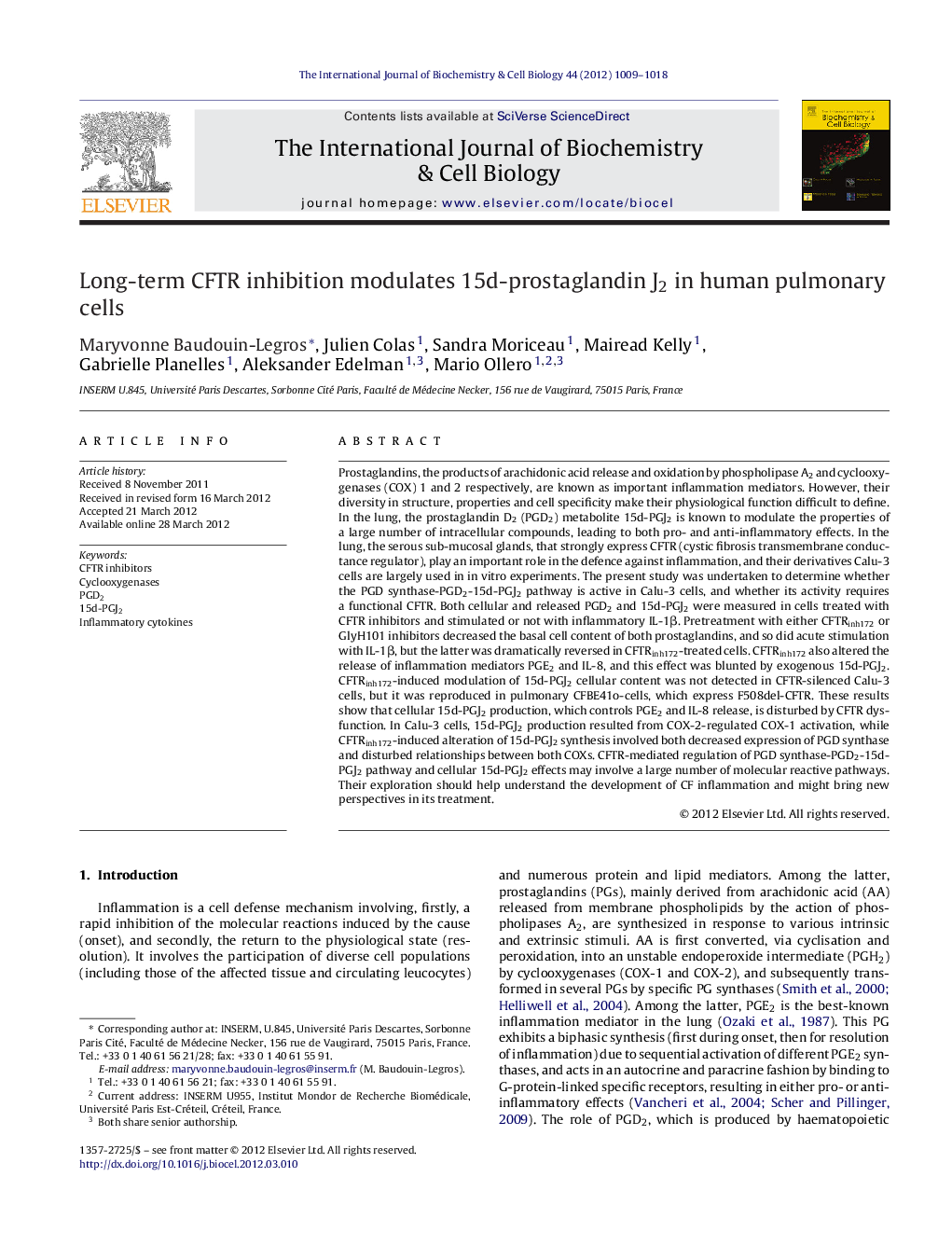| کد مقاله | کد نشریه | سال انتشار | مقاله انگلیسی | نسخه تمام متن |
|---|---|---|---|---|
| 1984004 | 1539917 | 2012 | 10 صفحه PDF | دانلود رایگان |

Prostaglandins, the products of arachidonic acid release and oxidation by phospholipase A2 and cyclooxygenases (COX) 1 and 2 respectively, are known as important inflammation mediators. However, their diversity in structure, properties and cell specificity make their physiological function difficult to define. In the lung, the prostaglandin D2 (PGD2) metabolite 15d-PGJ2 is known to modulate the properties of a large number of intracellular compounds, leading to both pro- and anti-inflammatory effects. In the lung, the serous sub-mucosal glands, that strongly express CFTR (cystic fibrosis transmembrane conductance regulator), play an important role in the defence against inflammation, and their derivatives Calu-3 cells are largely used in in vitro experiments. The present study was undertaken to determine whether the PGD synthase-PGD2-15d-PGJ2 pathway is active in Calu-3 cells, and whether its activity requires a functional CFTR. Both cellular and released PGD2 and 15d-PGJ2 were measured in cells treated with CFTR inhibitors and stimulated or not with inflammatory IL-1β. Pretreatment with either CFTRinh172 or GlyH101 inhibitors decreased the basal cell content of both prostaglandins, and so did acute stimulation with IL-1β, but the latter was dramatically reversed in CFTRinh172-treated cells. CFTRinh172 also altered the release of inflammation mediators PGE2 and IL-8, and this effect was blunted by exogenous 15d-PGJ2. CFTRinh172-induced modulation of 15d-PGJ2 cellular content was not detected in CFTR-silenced Calu-3 cells, but it was reproduced in pulmonary CFBE41o-cells, which express F508del-CFTR. These results show that cellular 15d-PGJ2 production, which controls PGE2 and IL-8 release, is disturbed by CFTR dysfunction. In Calu-3 cells, 15d-PGJ2 production resulted from COX-2-regulated COX-1 activation, while CFTRinh172-induced alteration of 15d-PGJ2 synthesis involved both decreased expression of PGD synthase and disturbed relationships between both COXs. CFTR-mediated regulation of PGD synthase-PGD2-15d-PGJ2 pathway and cellular 15d-PGJ2 effects may involve a large number of molecular reactive pathways. Their exploration should help understand the development of CF inflammation and might bring new perspectives in its treatment.
► Acute IL-1β stimulation and long treatment with CFTR inhibitors decrease 15d-PGJ2 in Calu-3 cells.
► IL-1β stimulation of cells pre-treated with CFTR inhibitors enhances 15d-PGJ2.
► CFTRinh172 reproduces CFTR-deleted Calu-3 or CFBE41o− cells behavior.
► Exogenous 15d-PGJ2 inhibits CFTRinh172-induced modulation of PGE2 and IL-8 release.
► CFTRinh172 alters PGD synthase expression and COX-1/COX-2 cross-talk.
Journal: The International Journal of Biochemistry & Cell Biology - Volume 44, Issue 6, June 2012, Pages 1009–1018